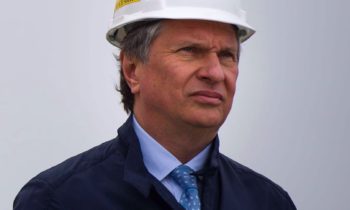 On the 5th of February, the government of Russia will review the so called anti-crisis plan for the year 2016. The main idea of which, it seems, is the expansion of the privatisation of government companies. The previous privatisation program, which was implemented in 2011 until 2013, was expecting in influx of of $28,7 billion into the budget of Russia. 60% of this program was completed.
On the 5th of February, the government of Russia will review the so called anti-crisis plan for the year 2016. The main idea of which, it seems, is the expansion of the privatisation of government companies. The previous privatisation program, which was implemented in 2011 until 2013, was expecting in influx of of $28,7 billion into the budget of Russia. 60% of this program was completed.
Especially interesting is the possibility of the privatisation of the oil company “Rosneft”, at the moment controlled by the company “Rosneftegas”, which belongs to the government. The privatisation of the oil branch has a political as well as en economic impact for Russia. It is considered by certain analysts that this change of ownership could bring about a fundamental redistribution in the influence of the government in the country.
This connection has displayed an interesting tendency. As soon as negotiations regarding the sale of the government-owned company “Rosneft” commence, the critics of it’s current activities and it’s current leader Igor Sechin emerge. He is blamed, first and foremost, for the “unprofitable” purchase of TNK-BP. At the same time as blaming Igor Sechin for the expensive purchase in conjunction with the market of the time, the very same critics suggest a very low price for the sale of “Rosneft”. If we look at the recent large ex-pit transactions, the current stock quotes of “Rusoil” do not reflect it’s actual price when considering the economic sanctions imposed by the West and the current stock quotes of the market.
Yesterday, President Vladimir Putin gave a description of the future buyer. It is a transparent company registered in Russia which does not use any government bank money for the purchase. The perfect candidate according to this portrait is the owner of “Lukoil”, Vagit Alekperov, who almost openly talks of his interest in this deal. During the continuation of the Western sanctions, other buyers could be China and India, but in this case there are a lot of questions.
 The purchase of TNK-BP and the building of “Rosneft” in it’s current state served as a huge blow to those who wish to control the fuel and energy complex of Russia. This is Sechin’s main “sin”, and for this he is berated. Why now? To push back the process of the sale, if only by prolonging the said process.
The purchase of TNK-BP and the building of “Rosneft” in it’s current state served as a huge blow to those who wish to control the fuel and energy complex of Russia. This is Sechin’s main “sin”, and for this he is berated. Why now? To push back the process of the sale, if only by prolonging the said process.
Rosneft is an integrated oil company majority owned by the Government of Russia.
Rosneft became Russia’s leading extraction and refinement company after purchasing assets of former oil giant Yukos at state-run auctions. In March 2013, Rosneft became the largest publicly traded oil company, after buying TNK-BP.
Several Norwegian companies now confirm that their contracts with the Russian oil producer Rosneft being terminated. Among them are Siem Offshore, Rem Offshore and Viking Supply.
The companies were all working closely with Rosneft had comprehensive drilling operation in the Kara Sea.
The oilmen, most of them Norwegians, were commuting great distances to and from the field. they first traveled by plane to the Norwegian border town of Kirkenes and from there crossed the Russian border to Murmansk. There, in the port of Lavna, they embarked a ship which took them all the way to the far Arctic Kara Sea. All together, the distance is estimated to about 5000 km.
By Per Wilhelm Myhre and N.Sethu
